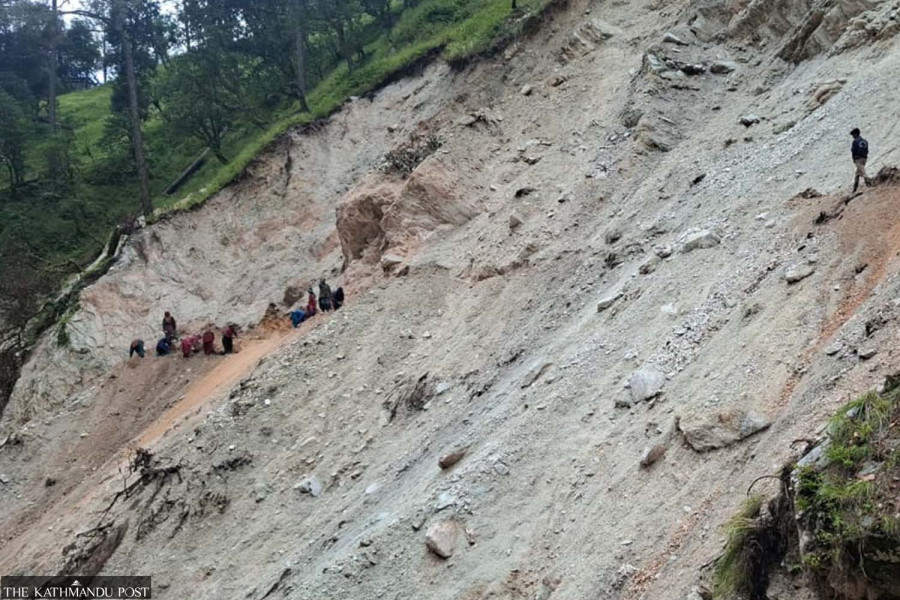National
Food shortage in remote Bajhang villages after sole supply trail cut off by landslides
Saipal Rural Municipality has been facing severe shortages of rice, oil and essentials for over a month. Rains have hampered repair work.
Basant Pratap Singh
Transportation of food and other daily essentials has been disrupted in Saipal, a remote rural municipality in Bajhang district, for the past one and half months. The locals are worried about a looming food shortage.
The only mule track that connects the remote settlements in Saipal with the outside world has been buried under a series of landslides triggered by monsoon rains. With the trail blocked, the transportation of food grains and daily essential commodities has come to a complete halt.
Saipal, one of the most inaccessible local units in Sudurpaschim province, relies on porters and pack animals, mainly mules and sheep, for transporting goods from Talkot to its highland villages. But locals say even walking the trail has become dangerous as rocks tumble down constantly.
“Forget mules, even people cannot walk safely. We are forced to walk under the constant fear of landslides and falling rocks,” said Basanta Bohara of Dhalaun in ward 2 of Saipal. “Now rice, oil and even soap are in short supply in local shops.”
What was once a six-hour walk from Angar of Talkot Rural Municipality to Saipal’s Samdeu now takes more than ten hours, and many sections have vanished entirely. Harish Awasthi, an employee at the local branch of Everest Bank in Saipal, said the shortage is dire. “I have about six kilos of rice left for three people. We have been searching for rice to buy, but there is none,” he said. “Many households have run out of stock completely, and borrowing has become impossible.”
According to locals, the worst-affected areas by landslides include Lisnigad, Angar, and Jadlekh in Talkot, and Ganai and Samdeu in Saipal. Residents have attempted to clear small stretches themselves, but large boulders remain immovable without machines.
“The villagers have repaired some stretches to make them passable, but huge boulders still block many sections,” said Narendra Dhami, chairman of ward 1 of Saipal Rural Municipality. “Without excavators, restoring the trail is impossible.”
Saipal is a cluster of five wards scattered across steep terrain. From Dhalaun, the entry point, it takes another two to three days of walking to reach the northernmost settlements. While some families in lower villages risk walking to Talkot’s Kuwa to bring back a sack of rice on their backs, this option is impossible for northern hamlets.
“We have already run out of rice, and some families don’t even have enough to cook for important rituals,” said Kinthya Rokaya of Dhuli. “The month of Bhadau (mid-August to mid-September) still has weeks of heavy rain ahead. If the path isn’t cleared sooner, we will be left hungry,” he lamented.
Locals blame the crisis partly on poorly executed road construction. Last year, a track was cut up to Jadlek on the Saipal border using a bulldozer, but instead of easing access, it destabilised the slopes. Ancient foot trails that villagers used for generations began collapsing under landslides triggered by haphazard bulldozer work.
“Our ancestors walked these trails for centuries, but now they are gone. The contractor dumped excavated soil and stones carelessly, and rains turned them into landslides. Many sections are now completely impassable,” said Rajendra Dhami, former chairman of Saipal Rural Municipality. He accused authorities of ignoring the detailed project report (DPR) and carving the road haphazardly.
Food insecurity has long haunted Saipal. The government-supplied subsidised rice rarely reached the municipality on time due to monsoon disruptions and poor transport links. Nepal Food Management and Trading Company delivered its last consignment in June, and since then no more shipments have arrived.
Chairman of Saipal Rural Municipality Manbir Bohara said the timing has worsened the hardship. “Dashain [Nepal’s biggest annual festival] is coming, and it has been months since the last supply of rice. The shortage is already acute,” he said. “We have mobilised several teams with ward offices to repair the damaged sections so that at least mules can pass. Within a few days, we hope to restore some supply.”
But villagers remain skeptical. They have heard similar assurances every year, yet food scarcity persists as soon as the rains set in. Experts have long warned that road construction without proper planning is increasing the risk of food insecurity in high-altitude settlements.
In places like Saipal, where agriculture is limited and people rely heavily on external supplies, a damaged trail can quickly push communities to the brink of hunger. “The rains have not stopped yet, and our food has already run out,” said Rokaya of Dhuli village. “If the trail is not repaired soon, famine will grip our villages.”




 17.12°C Kathmandu
17.12°C Kathmandu














